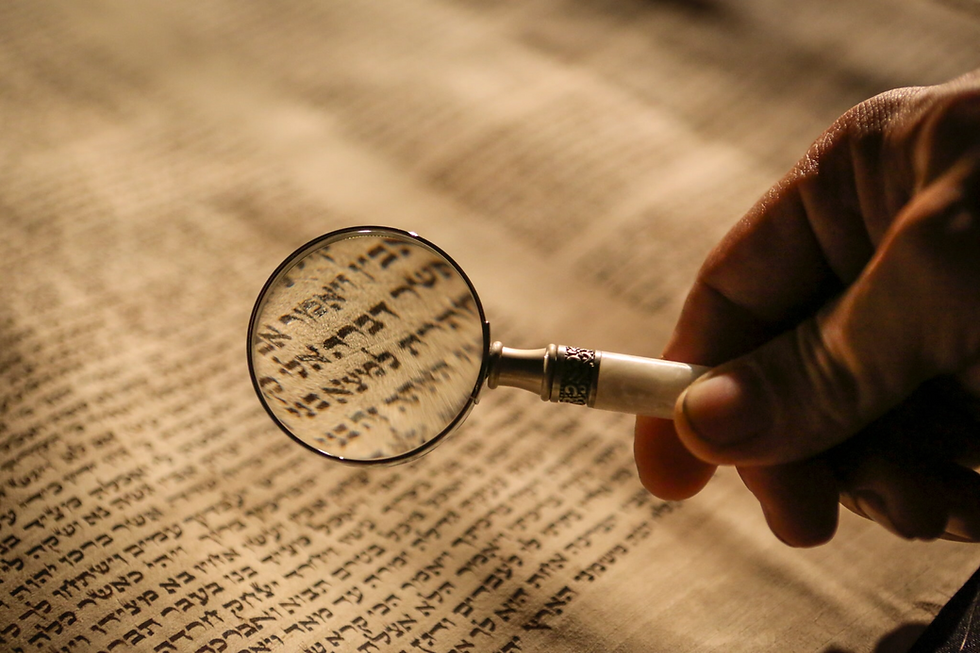Understanding Basic Terms
- Leisa Baysinger

- Oct 5, 2016
- 4 min read
Updated: Jul 9, 2022
Below is listed some current Hebrew words and their meanings. Most of these words are used often in my articles and it is my desire for readers to understand what they mean.
TaNaKh - Our Old Testament. In Hebrew it stands for Torah, Neviim, and Ketuviim. Torah will be discussed below. Neviim means prophets and indicates the Prophetic Books. Ketuviim means the writings and refers to Job, Psalms, Proverbs, Ruth, Esther, Song of Solomon, Lamentations, Ecclesiastes, Ezra, Nehemiah, Chronicles, and Daniel. Together these three parts: Torah, Books of the Prophets and the writings make up the Scriptures that Yeshua and His disciples would have read.
The TaNaKh is exactly the same as our Old Testament accept the books are in a different order and many of the books that we separate are combined into one book. The TaNaKh Cannon has been exactly the same since at least 200 years before Jesus. Therefore, as mentioned above it would have been the scriptures that Yeshua and His disciples read and studied and considered Holy and set-apart.
Torah - The Torah is the first 5 books of the Bible: Genesis, Exodus, Leviticus, Numbers, and Deuteronomy. Contrary to popular belief, Torah does not mean "law", it means more accurately "teachings and instructions". The Torah was written by Moses.
Yeshua - Jesus. I choose to spell His Hebrew name this way and I refuse to get caught up in the debate about how it was spelled. Yeshua is still a popular name in Israel and this is its spelling translated into English. It is shortened as "Yeshy" or “Yeshu”. My personal belief is that we have more to be concerned about than arguing over the spelling of a name. Personally, I found salvation under the name of Jesus and this name has carried me throughout my life. He is a personal God and He knows exactly who I am calling upon. I do not shun from the English name, although I prefer the Hebrew one now. If I were Spanish, I might call Him Hesus. I am sorry if this offends anyone but again, before I knew a word of Hebrew, I KNEW HIS NAME AND HE KNEW ME! In moments of distress I still catch myself calling out the name Jesus, very quickly, and He hears my cry every time.
YHWH or YHVH (Yod, Hey, Vav, Hey) - Known as the Tetragrammaton in Hebrew. This is the personal name of the God of Abraham, Isaac and Jacob. The God of Israel. Jews do not pronounce this name because they consider it blasphemy. Because of this, the correct pronunciation of The Name has been lost. If anyone tells you differently, they are wrong. The Jews will not even print or write the sacred name, instead they say or write Adonai or refer to God as The Name. (Hashem). They will often write even G-d, leaving out a letter to be careful. It may be pronounced close to Yahweh. Either way, this is another thing that I WILL NOT ARGUE ABOUT, nor should we, because NO ONE knows for sure!
Brit Hadashah - or Brit Chadashah. The New Testament. A more correct wording would be The Renewed Covenant, as the Greek even implies. Remember The New Testament did not exist during the days when Yeshua and His disciples walked the earth. The only Scripture they had was the TaNaKh. The New Testament had not yet been written until many years after the death, burial, and resurrection of Yeshua.
Elohim - Generic name for God; just as "God" is a generic name for any god. In scripture Elohim can refer to any man-made god but usually it refers to the God of Abraham, Isaac and Jacob. It is the first name that God uses for Himself in Genesis chapter one. Some other names along the same line are: El (singular), Eloah, Adonai (plural), Adon (singular).
Talmud - The Talmud is the oral law of Orthodox Jews. They believe that during the 40 days and nights that Moses was on Mt. Sinai that he was given a second Torah that was to be transmitted orally to the people. This oral transmission was to go on from generation to generation. The oral torah was transmitted orally for thousands of years until the destruction of the second temple in 70 AD and the Bar Kokhba revolt of 135 AD, when all the Jews were expelled from the land. At that point it was still being transmitted orally but the Rabbi's were afraid that their teachings and instructions would be lost, due to the dispersion of the people. So, the oral law (oral torah) was eventually written down around 200 AD by Judah Ha-Nasi. It is called the Mishna; which means "that which is repeated". The Talmud includes the Mishna plus further Rabbinic commentary on the Mishna by later Rabbi's. The belief in this Oral Law, (Oral Torah) is the basic doctrine which defines modern Orthodox Judaism and anciently was also the ruling doctrine of the ancient Pharisees of Yeshua's day. The problem with the Oral Torah is that they put more emphasis on it than on the written Torah of Yahweh. In the Oral Torah Rabbi's are given permission to change the laws of God. This is why Yeshua (Jesus) had a problem with the doctrines of His day. It was this tradition of man that He had a problem with, not the Torah of Yahweh.
Any person desiring to understand the Bible needs to study the Talmud so that they can understand the mindset of the Jewish people; then and now. It should be taught in seminary.
Shalom!
Leisa
Bibliography
Babylonian Talmud, Sabbath 31a;
Josephus Flavius, Antiquities of the Jews 13.10.6






Comments